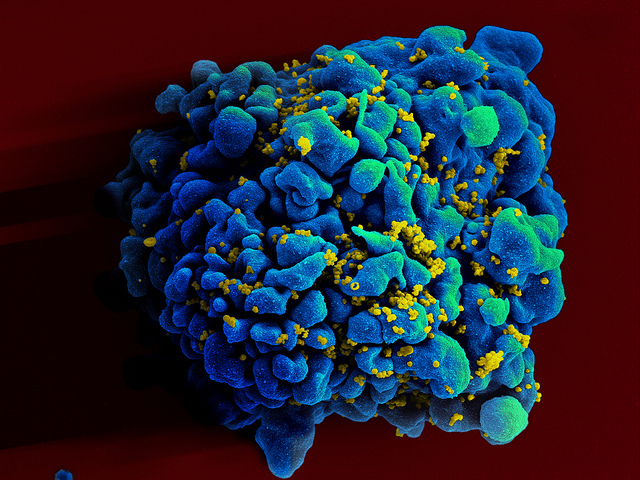20 July 2023. A treatment for HIV taken just once, using the genome-editing technology Crispr, is receiving fast-track designation from the U.S. Food and Drug Administration. Excision BioTherapeutics Inc. in San Francisco, developer of the therapy code-named EBT-101, calls the one-time infusion a functional cure for HIV infections.
Human immunodeficiency virus or HIV attacks CD4 lymphocytes, white blood cells in the immune system, which weakens the body’s ability to prevent opportunistic and severe infections, such as tuberculosis. In advanced stages, people with HIV can contract acquired immunodeficiency syndrome or AIDS, a deadly condition. HIV is spread by exchange of bodily fluids, such as blood and semen, as well as from mother to child in pregnancy. According to World Health Organization, some 39 million people in the world are living with HIV, of which 25.6 million are in Africa. WHO estimates 630,000 people died from HIV-related infections in 2022, with 1.3 million new HIV cases that year.
The recommended care for HIV is antiretroviral therapy that suppresses the viral load, reducing risks of infection and spreading the disease to others. The treatments, taken daily in most cases, make it possible to renew CD4 white blood cells and reduce HIV to virtually undetectable levels. Yet HIV remains latent in people with HIV, who must continue taking antiretroviral treatments as prescribed during their lifetimes for the therapy to be effective.
Excision BioTherapeutics is an eight year-old company commercializing discoveries licensed from the labs of Crispr pioneer Jennifer Doudna at University of California in Berkeley — awarded the 2020 Nobel Prize in chemistry with Emmanuelle Charpentier for their discoveries of genome editing with Crispr — and HIV/AIDS researcher Kamel Khalili at Temple University. Crispr, short for clustered regularly interspaced short palindromic repeats, uses a technique based on bacterial defense mechanisms that harness RNA to identify, monitor, and edit specific locations in DNA.
Testing treatment at three dosage levels
EBT-101 is the company’s lead product, delivering its Crispr payload in a single intravenous infusion with a benign adeno-associated virus containing dual RNA guides. Those RNA guides send Cas9 editing enzymes to three sites in the HIV genome, where the edits remove large sections of DNA, preventing viral escape and reproduction. Excision Bio says EBT-101 disables HIV viruses, thus preventing further infections.
The company is testing EBT-101 in an early- and mid-stage clinical trial enrolling nine individuals with HIV and taking antiretroviral therapy, at three locations in the U.S. The study team is assessing the safety of EBT-101 at three dosage levels, looking primarily for incidence and severity of adverse effects from the treatments for 48 weeks. Trial participants can also take part in a follow-up study with semi-annual check-ups for five years, then annual reviews for another 10 years. Science & Enterprise reported on the start of the trial in Jan. 2022.
Excision Bio says today that FDA assigned a fast-track designation to EBT-101. Fast track status, according to FDA, is given to therapies, vaccines, or diagnostics for serious medical conditions showing superior effectiveness, reduced adverse effects or toxicities, improved diagnostics where early detection improves outcomes, or addressing major public health needs. The designation provides developers with more frequent access to FDA on drug development and clinical trials, review of new drug or biologic license applications in sections rather than waiting until all pass are complete, and eligibility for further accelerated reviews.
In a company statement released through Globe Newswire, Excision BioTherapeutics CEO Daniel Dornbusch notes, “This designation underscores the importance of finding a cure for people living with HIV and bolsters Excision’s efforts to rapidly develop potentially curative therapies for significant unmet medical needs.”
More from Science & Enterprise:
- Crispr Therapy Shown to Reduce Harmful Gut Microbes
- Pharma Company Gains Precise Gene Edits in $2B Biotech Deal
- Crispr Therapy Shown to Remove E. Coli in Gut
- Company Started for Gene Editing Rare Inherited Diseases
- Patent Issued for Crispr-Edited Viruses in Microbiome
We designed Science & Enterprise for busy readers including investors, researchers, entrepreneurs, and students. Except for a narrow cookies and privacy strip for first-time visitors, we have no pop-ups blocking the entire page, nor distracting animated GIF graphics. If you want to subscribe for daily email alerts, you can do that here, or find the link in the upper left-hand corner of the desktop page. The site is free, with no paywall. But, of course, donations are gratefully accepted.
* * *


 RSS - Posts
RSS - Posts
You must be logged in to post a comment.